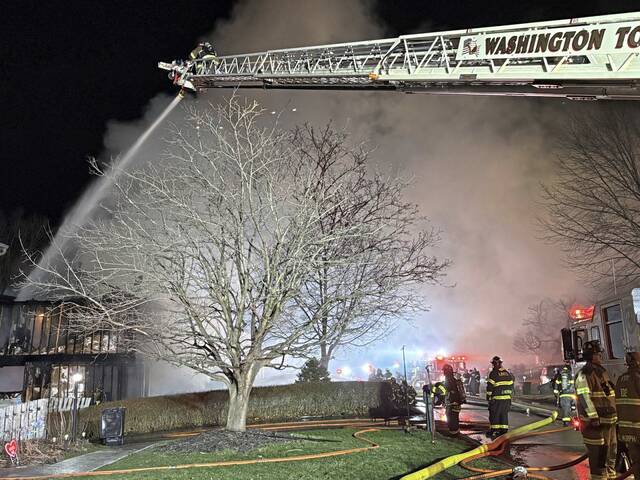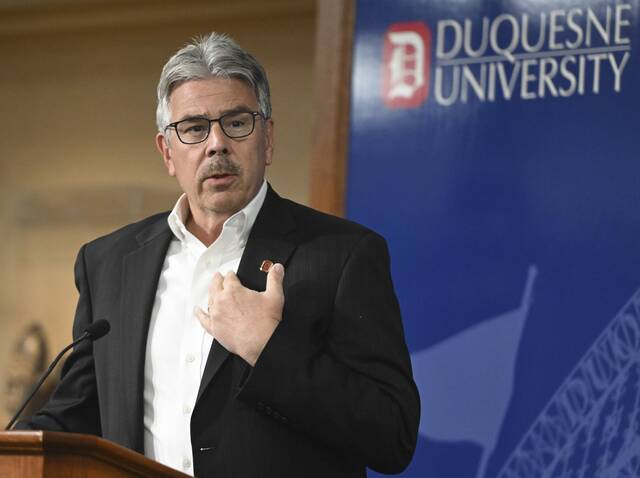Eleven times, the prosecutor repeated the same sentence, changing only the subject.
“Her loss, alone, is sufficient to justify a sentence of death.”
“His loss, alone, is sufficient to justify a sentence of death.”
Eleven times, one for each person killed in the mass shooting at a Pittsburgh synagogue nearly five years ago, the prosecutor reiterated to the jury what he is asking them to do.
“Apply the only punishment that is sufficient under our law — a sentence of death,” U.S. Attorney Eric Olshan said in his closing arguments in the penalty- selection phase of the trial in the case against Robert Bowers.
But during her closing, renowned defense attorney Judy Clarke made her own plea.
“You can give the weight of life to Rob’s lifelong struggle with mental illness. You can give the weight of life to mercy. You can give the weight of life to stopping the killing,” Clarke said. “You’ve held Robert Bowers accountable. Now, we ask you to choose life and not more death.”
Bowers, 50 of Baldwin was found guilty of all 63 counts against him for killing 11 congregants at the Tree of Life synagogue in Squirrel Hill on Oct. 27, 2018, and shooting five others.
The government is seeking capital punishment on 22 counts, including that the defendant killed the victims because of their religion.
The defense has asked the jurors to allow their client to serve the rest of his life in prison with no chance for release, arguing that their client has schizophrenia and should be spared.
A death sentence must be unanimous.
The jury of seven women and five men began deliberating shortly after 9 a.m. Tuesday morning.
Jury is asking to see the weapons #SynagogueShooting killer used in 2018 attack. Attorneys now hashing out details. @TribLIVE
— Justin Vellucci (@JVTheTrib) August 1, 2023
As he began his closing argument Monday afternoon, Olshan played for the jurors snippets of the chilling 911 calls that came from inside the synagogue on the morning of the shooting. Voices could be heard pleading, crying, screaming.
“That man,” Olshan said, dramatically pointing to the defense table, “a stranger, entered the building. He entered a holy place, a sanctuary, and he defiled it.”
One by one, Olshan spoke about each of the victims, repeating their names and showing jurors photographs of them smiling, laughing and posing with their children and grandchildren. They included Rose Mallinger, 97; Bernice Simon, 84, and her husband, Sylvan Simon, 86; brothers David Rosenthal, 54, and Cecil Rosenthal, 59; Dan Stein, 71; Irving Younger, 69; Dr. Jerry Rabinowitz, 66; Joyce Fienberg, 75; Melvin Wax, 87; and Richard Gottfried, 65.
They were members of the Tree of Life-Or L’Simcha, Dor Hadash and New Light congregations, all of which were based at the Tree of Life synagogue at the time of the attack.
Olshan juxtaposed those smiling images on one side of the screen with photographs from inside the synagogue showing each of the victims in death, where they lay that morning after Bowers killed them.
“Don’t forget the dead, the ones who couldn’t speak for themselves,” said Olshan, who spoke for nearly 90 minutes. “The weight of all that loss … put it on a scale. Weigh it for this defendant, who is proud he carried out the worst mass shooting against Jews in U.S. history. Weigh it.”
Olshan spent most of his closing picking apart the defense team’s evidence during the penalty phase.
He questioned whether Bowers has schizophrenia, pointing out that three defense experts who called his thinking “delusional” did no research on the white supremacist beliefs Bowers espoused.
He said the defense never proved Bowers suffered from epilepsy. Although it played a prominent role earlier in the trial, Olshan noted that the defense didn’t even list it as a mitigating factor in this phase of the case.
“If the evidence supporting one of his claims is suspect, it’s all suspect,” Olshan told the jury.
He also questioned the notion that Bowers’ troubled childhood and mental illness could outweigh the heinousness of the crimes he committed.
Bowers was a 46-year-old man when he carried out the attack.
“He is responsible for his actions, don’t forget that,” Olshan said.
The defendant has regrets, Olshan said, just not the right ones.
“He regrets that he didn’t plan better. He regrets that he did not kill more Jews,” Olshan said.
But Bowers doesn’t regret the murders, the prosecutor added.
“Take that aggravating factor,” Olshan said. “Feel its weight (and) put it on a scale.”
To impose death, the jurors must find that the aggravating factors outlined by the government — in this case, there are nine of them — outweigh any mitigating evidence from the defense.
“How do you measure the impact of all that loss?” Olshan asked. “The absolute crushing weight of the loss and impact of every person killed — put it on the scale.”
While the prosecution must prove the aggravating factors unanimously and beyond a reasonable doubt, mitigating factors are determined by individual jurors and only by a preponderance of the evidence.
The defense has listed 115 possible mitigating factors.
As both parties laid out their case for whether Bowers should live or die, the jurors sat rapt as images from inside the synagogue, instructions on the law and photographs of the victims filled their monitors.
In the front row of the gallery, Diane Rosenthal wrapped her arm around her sister, Michele, as she listened to Olshan describe the last moments of their two brothers, Cecil and David Rosenthal, who were killed that day.
Loved ones for each of the victims sat close together as they have since the trial started on May 30 — some clutching blankets, others writing in notebooks, all of them solemn.
On the defense side of the courtroom, Bowers’ aunt, Patricia Fine, sat among staff from the public defender’s office listening.
Clarke began her closing argument urging the jurors to follow the oath they took during jury selection.
“You can’t stop with the crime and the harm that it caused,” she told them. “You told (U.S. District) Judge (Robert) Colville you would not do this … that you needed to know more than just the crime itself.”
Clarke reminded the jurors that on their initial questionnaires — filled out back in March — they agreed they wanted to know more about the defendant, that they would not vote automatically for death.
And Clarke said it wasn’t that they would just listen to the mitigating evidence, but that they would meaningfully consider it.
“We believed you then, and we believe you now,” she said. “We believe you will keep your promises to the court and yourselves.
“You must be careful. You must be cautious. You must be considerate.”
Clarke suggested that the right verdict is life in prison without release — and ultimately, a natural death in obscurity — versus a death sentence where her client dies a hero, a martyr.
Clarke also told the jurors that a person’s childhood matters. She reminded them of her client’s chaotic and unstable formative years.
“It shapes and molds us. We know genetics matter. We know environment matters. We know nature and nurture matter,” she said.
Bowers never knew safety and security in childhood, Clarke said.
“What a tragedy is that?” she asked. “But is that who we kill?”
She repeatedly told jurors that they had to make a deeply moral decision as individuals.
“This is about who you are, your values, your sense of justice, your own understanding, your own sense of humanity,” Clarke said.
No one is ever required to vote for death, she said.
“Don’t come to a decision just because other jurors think it is right,” Clarke said. “You could be confronted with a situation where you are the only one. ‘What if I’m the only one standing in the way of the other 11?’”
If that happens, she told them, they must be true to their conscience.
“No one can force you to vote for the death penalty if you believe … a sentence of life in prison without the possibility of release is sufficient. No one,” Clarke said.
In rebuttal to the defense closing, Assistant U.S. Attorney Troy Rivetti implored the jury to use common sense when weighing Bowers’ mental health or troubled childhood, both mitigating factors for the defense, against aggravating factors in the 2018 shooting, such as the number of victims or their vulnerability in a house of worship.
He told the jury that Bowers had adults in his life who loved him and opportunities in school and adulthood.
“He’s just filled with hate. He chose to kill,” Rivetti said. “His executive functioning is just fine. He can plan, assess risks and move to plan B … and he has no regrets.”
The suggestion that Bowers should be shown mercy runs counter to how he comported himself, Rivetti said.
“He is proud of what he did. He killed all of them. He has no remorse,” Rivetti said. “The magnitude of his crimes is staggering — the death, the devastation and the grief.”
Rivetti also attacked the defense suggestion that the jury should show mercy so Bowers can learn in prison how his actions were wrong.
“Life in prison is the minimum sentence here,” Rivetti said.
Does a man convicted of murdering 11 people deserve minimum punishment, he asked.
“Whatever mitigation you may find, it doesn’t even come close.”
Earlier Monday, the defense concluded its case with testimony from Fine, Bowers’ aunt.
She told the jury that her father — Bowers’ grandfather with whom he remained close throughout his life — served in the U.S. military in Germany during World War II.
He helped find Holocaust survivors at the Auschwitz concentration camp. It remained the thing he was most proud of in his life.
Bowers, who lived with his grandfather and cared for him in the final years of his life, was also proud of his Papa.
“It just makes it all that much worse,” Fine said. “That his mind was broken, that that’s what he thought with where he came from.”
Fine said she had a close relationship with her nephew as a child, and that he often slept over at her house. She had concerns about suicide ever since Bowers was young.
She recounted how Bowers intended to go to technical school after high school but couldn’t get the necessary student loans because his mother refused to file a federal tax return.
“It was something the defendant was still angry about 30 years later.”
As an adult, Fine said her nephew was kind of a rule follower. After she had to undergo hip surgery and was sent to a rehab facility, she said he took dinner to her every night.
Fine told the jury she learned about the synagogue shooting the evening after it happened.
She said she never thought her nephew would hurt someone else.
“He was not that type of person,” Fine said. “I was so certain he would commit suicide. I still find it hard to believe he could take other people’s lives.”
Fine said her nephew never expressed antisemitic views to her. On occasion, she said on cross-examination, he would send her emails about conspiracies involving Qanon or Antifa.
Each time, she wrote back to him, “‘Show me some facts. Get a job.’”
Since his incarceration at Butler County Prison, Fine has written 100 letters to her nephew. In one, dated Aug. 3, 2020, Fine apologized to him for not doing more to help him as a child.
“I hope you know deep down inside how much you are loved,” Fine wrote. “I am so sorry the adults in your life weren’t there for you in the way you needed.
“I wish I would have listened more, understood more and loved more. You deserved better.”
Fine wrote that her nephew’s family failed him.
“You are in a position that would not exist if the adults around you would have been there,” she wrote. “I do not understand, but I love you.”
Fine told the jury she did not condone her nephew’s actions, and then briefly addressed the gallery of survivors and victims’ family members.
“I am so sorry to the entire victim community,” she said. “I cannot begin to imagine the grief and the pain. If I had known how ill (Bowers was) I would have stopped it.
“I will be sorry every day of my life that I didn’t realize the help he needed.”








